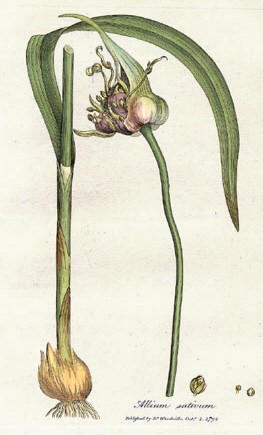
"The U.S death rate from infectious diseases is about 170,000 annually, double than what it was in 1980. With two billion people traveling by air each year, the potential for serious viral illnesses looms even larger in our future" - National Intelligence Council, The Global Infectious Disease Threat and Its Implications for the US; Jan 2000.
Plant-based foods are amazing for your health as you already know, but certain foods have specific properties that have been linked to improving immune system function. These foods contain certain properties as you'll see below that not only target heart health, but also help improve gut bacteria, which in turn positively affects the immune system. Like nature's version of antibiotics, these foods make great foods in to include in your diet whether you're already sick or trying to prevent getting sick.
Garlic
Garlic and garlic extracts provide protection against free radical damage in the body via allyl disulfide, alliin, allicin, and allyl cysteine, all of which are powerful antioxidants. They have also been linked to better gut health, which improves your immune system naturally. The immune system is largely located in the digestive system, so keeping your good bacteria healthy with foods like garlic (and onions) is a great way to enhance immune function naturally.
Onions
Onions, like garlic, contain allicin. They also contain quercetin, a nutrient that breaks up mucus in your head and chest while boosting your immune system. Additionally, the pungency of onions increases your blood circulation and makes you sweat, which is helpful during cold weather to help prevent infections. Consuming raw onion within a few hours of the first symptoms of a cold or flu produces a strong immune effect.
Cabbage
Phenolic contact, or concentration of flavonoids/antioxidants are the main reason onions are so powerful are for warding off illness, like the cold or a flu. Fresh and pickled red cabbages have the highest total phenolic content of the different types of cabbage. The antioxidant capacity of raw and processed cabbages is highly correlated with their contents of polyphenols like kaempferol, quercetin, and apigenin.
Ginger
Spicy, pungent, and delicious, ginger reduces fevers, soothes sore throats, and encourages coughing to remove mucus from the chest. Anti-inflammatory chemicals like shagaol and gingerol give ginger that spicy kick that stimulates blood circulation and opens your sinuses. Improved circulation means more oxygen is getting to your tissues to help remove toxins and viruses.
Basil
Phenolics, a group of organic compounds found in tea, herbs, fruits and vegetables, account for the majority of basil's antioxidant properties, and these include vicenin, orientin, eugenol and anthocyanins. Again, to match these antioxidants, there is also antiviral properties that contain DNA protecting flavonoids. Among these flavonoids are estragole, linalool, cineole, eugenol, sabinene, myrcene, and limonene which are all capable of restricting the growth of numerous harmful bacteria, including listeria, staphylococcus, E. coli, yersinia enterocolitica, and pseudomonas aeruginosa.
Cayenne
The cayenne family of hot peppers (cayenne, habanero, Scotch bonnet, and bird peppers, to name a few) contains capsicum - a rich source of vitamin C and bioflavonoids, which aid your immune system in fighting colds and flus. It does this by increasing the production of white blood cells, which cleanse your cells and tissues of toxins.
Cayenne pepper is also full of beta carotene and antioxidants that support your immune system and help build healthy mucus membrane tissue that defends against viruses and bacteria. Spicy cayenne peppers raise your body's temperature to make you sweat, increasing the activity of your immune system.
Squash
Squash is a good source of vitamin C and carotene. The six carotenoids found most commonly in human tissue and supplied by squash and other gourds decrease the risk of various cancers, protect the eyes and skin from the effects of ultraviolet light, and defend against heart disease.
One of them, alpha-carotene, helps slow down the aging process. Butternut squash is the strongest source of these nutrients, but you can also try acorn, Hubbard, delicata, calabaza, and spaghetti squash.
Citrus Fruits
Adding a bit of citrus to your diet goes a long way toward fending off your next cold or flu. Packed with vitamin C, oranges and grapefruits help increase your body's resistance to nasty invaders.
Green Tea
Green tea is a potent source of antioxidants called polyphenols especially catechins. Some studies have found that catechins can destroy the influenza and common cold viruses.
Mushrooms
For centuries, people around the world have turned to mushrooms for a healthy immune system. Contemporary researchers now know why. Studies show that mushrooms increase the production and activity of white blood cells, making them more aggressive. This is a good thing when you have an infection.

